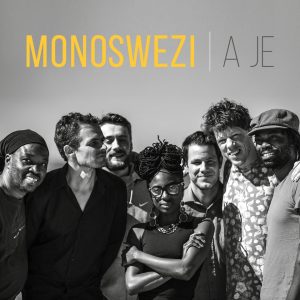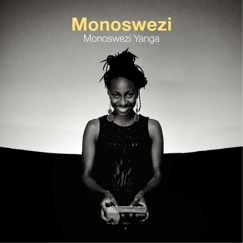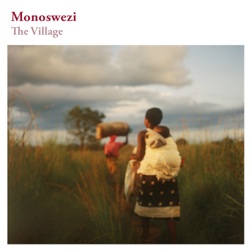A JE African-Nordic jazz alchemists Monoswezi explore new sonic worlds in their third Riverboat Records album. A Je features the compositions of bandleader Hallvard Godal with a fresh hosting of new musical collaborators. Expanding their sound even further afield, Monoswezi’s minimalist global groove is chic as ever and well ahead of the curve. Inspired to introduce chord textures to Monoswezi’s vernacular, the band flexes their line-up to include Indian harmonium, guest musician Sidiki Camara plays Malian ngoni and additional percussion and Kim Johannesen plays the African-American banjo. African music remains central to Monoswezi’s inspiration. Their compositional approach draws on Hope Masike’s Zimbabwean and Calu Tsemane’s Mozambican musical heritage alongside the rest of the band’s Nordic jazz tilt. In conversation Hallvard remarks on his earliest encounters with the music of Mozambique: ‘the music felt like a wheel, spinning, without beginning or end’. Opening track ‘Loko U Muka’ really catches this sentiment with rippling cyclical mbira and banjo lines atop interlocking bass line and Calu’s vocal.
Monoswezi yanga
Monoswezi bind themselves together on Monoswezi Yanga, gently singing reworked folk songs and whispering vivid tales. Hope Masike’s dulcet tones guide the album. She assumes the role of storyteller, underpinned by smooth unobtrusive accompaniment. As listeners we are invited to gather round, to sit at her feet soaking up the illuminated myths and legends of her childhood.
Monoswezi Yanga is the group’s second album on Riverboat Records, following the critically acclaimed 2013 release The Village. The recording took place at bass player Putte Johander’s home studio on the Koster Islands in Sweden. The islands are remote and free from cars; the native silence is punctuated by the sound of surrounding waters lapping against rocky coastlines.
As the cosmopolitan band live across three countries (Norway, Sweden and Zimbabwe), meeting up in full is a treasured but rare occasion. Studio time is precious and experimentation the order of the day. Often tracks are laid down in one take and then post-produced by the Scandinavian-living members Hallvard, Erik, Calu and Putte. Mixes are then bounced across the globe to Hope who contributes feedback from her home in Zimbabwe. Though unconventional, this working method imprints their music with a beautifully loose and open aesthetic. The music is not over-thought or preened to pretension. The music is fluid, organic, and free.
Hallvard’s Scandi-jazz saxophone approach is round of tone and melodically minimal. Putte’s bass lines are rock-solid, firming up the jazz foundations. Erik brushes and bristles his drum set with subtle swing. Calu’s percussion surges tightly below Hope’s Shona-language singing and punctuating mbira.
The role of the Zimbabwean mbira is paramount to Monoswezi’s style. Hope raises the flag for female mbira players everywhere, unlocking rhythmic routes through the sound on every track. Monoswezi Yanga also experiments with the use of a bass mbira as heard resounding low on last track ‘Nhetembo’. The result is entrancing: a slowly revolving, other-worldly fantasia for mbira.
A reading of the lyrics reveals a rich tapestry of traditional Zimbabwean folk songs and stories. ‘Matatya’ is a plea for a new lover from a young girl tired of ‘kissing frogs’. ‘Lobola’ and ‘Wadadisa’ are songs to celebrate marriage. ‘Dande’ is a prayer asking for protection over family and friends. ‘Mhondoro’ is a cautionary tale, imploring listeners to care for their environment. Each one is reshaped, performed anew and given a unique Monoswezi slant. Hallvard commented that often during the compositional process, he won’t be working with prior knowledge of the folk song in its original form, whereas Hope will have grown up with the tune and lyrics moulded into her musical consciousness. This difference in approach means the creative process can spin off in new uncharted directions uninhibited by a sense of what’s right or appropriate to the original.
‘Naku Xuva’ is an original composition by Calu, an ode to lost loved ones. Calu’s muted vocal is mournful and the guitar riffs lightly across the stripped back texture. The tracks ‘Povo m’povo’ and ‘Nhetembo’ are about fighting for what’s yours and an mbira is used to symbolically illustrate the tale: it is stolen in the first track and returned at the close of the album providing a satisfying symmetry to the work.
The Village, Monoswezi’s debut album, is a collection of rearranged Zimbabwean traditional songs blended with a cool Nordic edge. What the band prize about Zimbabwean music is its inherent openness, a quality that shares much with that fresh airy feel inherent in the Scandinavian jazz sound.
Creatively they carve a musical link that not only sounds entirely new, but crosses the oceans, eschews politics and embraces wholeheartedly the values of cross-cultural collaboration.
The music is structured via looping cyclical riffs that lock down into solid rhythmic patterns. The band describes their music as ‘strong’, a term that communicates well the steady, circuitous nature of the music. It is an idea that has been a source of interest for other composers, including minimalist maestros Philip Glass and Steve Reich, whose parallel influence can be heard on works such as the cell-like track ‘Metal Drum’. Here the atmosphere conjures up the same spooky, anticipatory feeling as Glass’s Glassworks or Reich’s Music for Pieces of Wood.
Hope Masike, who can be heard playing mbira and singing throughout the album, is a remarkable musician, trained in traditional music, jazz, dance, and more. Not only can she interlock tight rhythms while singing with a smooth unforced voice, but she is one of a relatively small number of females who play the mbira. Following in the footsteps of pioneers such as Stella Chiweshe, Hope plays the instrument – which has historically been male-dominated – with pride. Hallvard Godal’s saxophone technique is clean and unadorned, a sound that locks in perfectly with the struck aesthetic of the mbira. Calu contributes gentle rolling vocals which he sings in Ronga, his Mozambican mother tongue.
Listening to the quirky cool sounds on this collection, the Monoswezi brand is set to expand even further afield, and who knows where their next experiment could take this back-bendingly flexible band…


